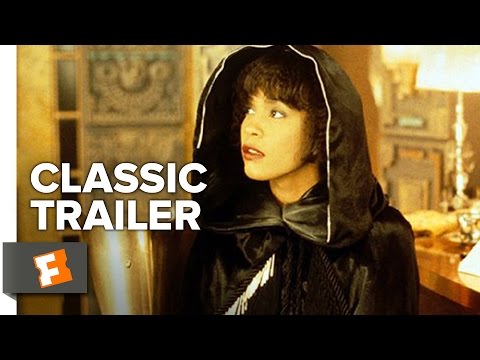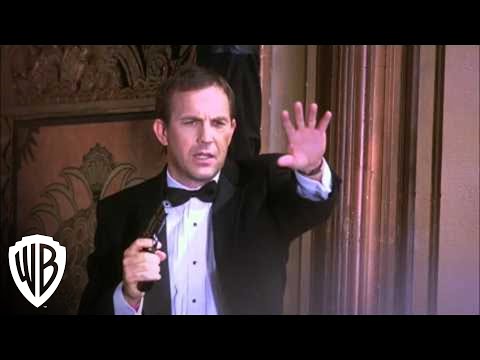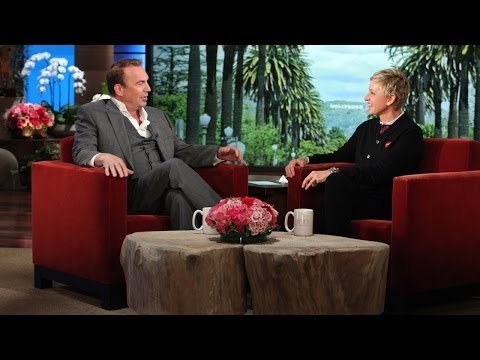The release of Kasi Lemmons’ “I Want to Dance With Somebody,” a music biopic on the life of the late Whitney Houston, has a surprising correlation with Houston’s highly touted film debut.
It’s been more than 30 years since “The Bodyguard,” starring Houston and Kevin Costner, overcame horrendous reviews, became a word-of-mouth blockbuster and spawned what remains, to this very day, the top-grossing soundtrack of all time.
Is the film itself any good or, like Lemmons’ film, does our fondness for Houston, Costner and those killer music cuts deliver goodwill the movie can’t? Despite some dopey screenplay choices and a famously campy showdown at the Oscars, “The Bodyguard” remains quite beguiling.
That has a lot to do with Houston and Costner.

Houston stars as Rachel Herron, an enormously successful music pop star who has been receiving death threats, creepy letters and the unwanted attention of a pale, menacing mouth breather. Enter Frank Farmer, played by Costner.
Famer is a bodyguard with, literally, the discipline and skills of a samurai, a no-nonsense attitude and no interest in the glamourous world in which Herron exists.
Farmer has been hired by Herron’s family friend, Devaney (the indispensable and always wonderful Bill Cobbs), much to the distrust of Herron’s fame-hungry producer (Gary Kemp of Spandau Ballet) and the current bodyguard (Mike Starr, another supporting actor MVP).
When the attacks on Herron’s life cut closer to home, it’s Farmer’s always-watchful eye and swift actions that keep Herron alive. A problem that they both recognize is that they’re falling in love with each other, making Farmer’s job impossible.

The screenplay for “The Bodyguard” was famously written by Lawrence Kasdan and intended as a vehicle for Steve McQueen and Diana Ross. Indeed, the script was dusty by the time the film was finally lensed decades later, though there were benefits in a delayed start.
Costner, with a distinctly McQueen haircut, is playing the role with exactly the kind of sturdy gravitas and humorless edge that McQueen would have brought. Houston, even in her first movie where she is sort-of playing herself, has a sassy warmth and joy that makes her a better choice over Ross.
As a tortured love story, and a keen fit for both its stars, “The Bodyguard” works.
What doesn’t always connect is how director Mick Jackson handles the story. The one-on-one scenes between the leads are always enjoyable but, as an action movie, it’s underwhelming.
Jackson, whose prior work was the wonderful Steve Martin-led and penned “L.A. Story” (1991), can’t even give “The Bodyguard” the injection of cracked energy he brought to his previous movie.
Jackson succeeds in making the film slick and engaging but fails to visually connect with the themes of the two contrasting worlds the way Ridley Scott did with similar material in his underestimated “Someone to Watch Over Me” (1987).
Kevin Costner Calls Clive Davis Whitney Houston’s ‘Bodyguard’: ‘You Were a Miracle in Her Life’ https://t.co/83TpEGEPnN
— People (@people) February 5, 2023
A quality I love about the lead performances is how both actors go out of their way to make their characters messy and, at times, hard to root for. Costner, likely trying to shed the goody-goody image playing a symbol of righteousness in “The Untouchables” (1987) and “Field of Dreams” (1989) makes Farmer gruff and emotionally impenetrable.
In fact, this is exactly why his work in “JFK” (1991) and especially “Waterworld” (1995) are so good – Costner pushes against this being a star vehicle by leaning into what is so frustrating about Farmer.
Likewise, Houston doesn’t let this become a vanity turn and makes Herron impulsive and, at times, even irritating. The screenplay doesn’t always develop plausibly, but Costner and Houston (who gives her best film performance here) are consistently good here.
Long-term memories of “The Bodyguard” are likely infused with the MTV videos far more than the film itself. I wish Jackson knew how to stage the action (his subsequent “Volcano” in 1997 at least has that), but this has a refreshing darkness and an uncompromised bleakness at the heart of the story.
Kasdan’s screenplay provides a sadly timeless commentary on how the music industry exploits its talent, and even gets away with an ending that manages to mimic both the romanticism and doomed outcome of “Casablanca.”
A key subplot involving the true nature of Rachel’s sister doesn’t make a lot of sense once you really think about it. Better are the little ways its suggested that Farmer isn’t just trained like a samurai and admires Toshiro Mifune (there’s even a clip of “Yojimbo”) but there’s a striking moment involving a sword that, oddly, acts as the film’s love scene.

This is the kind of movie where Entertainment Tonight provides exposition and, for all the chutzpah it exudes, the wild Oscar ceremony climax can only manage cameo appearances from two real celebrities playing themselves (in this, Robert Wuhl and Debbie Reynolds).
Yet, the finale at the Oscars has one of the film’s most bruising moments: after the fracas, Kemp’s sleazeball producer picks up the bloodied Oscar card, wipes it off and takes it home, an honest character choice.
Whereas Costner could have simply given his audience what they wanted, there are two big anti-mainstream choices here: this is a love story about two people who can’t be together, and a Whitney Houston vehicle that never lets Houston sing a song in its entirety. The former touch is an asset, while the latter is baffling (what were they thinking?).
FAST FACT: When Dolly Parton first heard Whitney Houston’s version of her song, “I Will Always Love You,” she had to pull her car over to hear it without distractions. “I was shot so full of adrenaline and energy, I had to pull off, because I was afraid that I would wreck.”
Released a year after the prior, sleazier Warner Brothers-distributed fallen secret service thriller “The Last Boy Scout,” Jackson’s film (despite vicious reviews) became a giant hit. Sporting the all-time bestselling movie soundtrack (as of this writing) and a far grimmer tone than most remember, “The Bodyguard” was viewed as more of a commercial than a creative success upon its release.
Looking at it today, there’s a bitter pessimism and melancholy quality to it and Costner and Houston connect with the tragic romance at the film’s dark core.
The post The Two Reasons ‘The Bodyguard’ Became a Sensation first appeared on Hollywood in Toto.
The post The Two Reasons ‘The Bodyguard’ Became a Sensation appeared first on Hollywood in Toto.